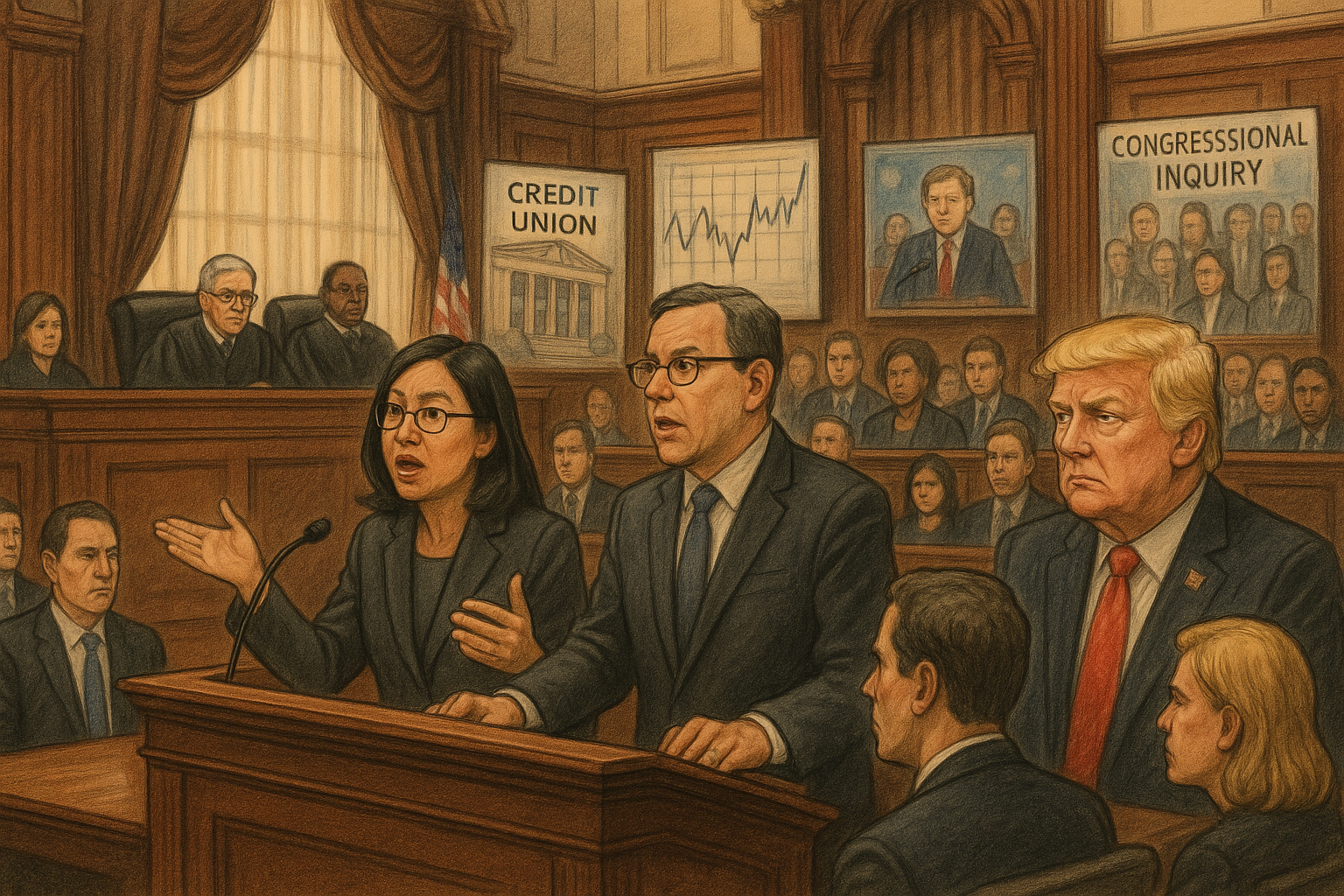Lawsuit Against Trump Over NCUA Board Removals Sparks Debate on Regulatory Independence
Former NCUA Board Members Sue President Trump Over “Unlawful” Removals
Two former National Credit Union Administration board members fired by President Donald Trump earlier this month have filed a lawsuit against the president and several other government officials, challenging what they describe as their “patently unlawful removal[s].” Todd Harper and Tanya Otsuka, both Democratic appointees to the NCUA board, filed the lawsuit on Monday, May 12, 2025, creating a significant controversy in the credit union regulatory landscape.
According to the lawsuit filed by attorney Vincent Levy of Holwell Shuster & Goldberg, who represents both plaintiffs, the president’s action is unprecedented. “During the Board’s nearly fifty years of existence, the President has never removed a Member whose term had not yet expired,” Levy wrote in the court documents. The removal has left the NCUA Board without the traditional quorum needed for formal operations.
Impact on NCUA Operations
The unprecedented removals have created significant uncertainty about the NCUA’s ability to function properly. Under normal circumstances, the Federal Credit Union Act requires at least two members to be present on the board for the NCUA to have formal meetings or make new rules. The law mandates that the NCUA be led by three board members, with no more than two aligning with one political party.
Harper and Otsuka’s departures leave only NCUA Chair Kyle Hauptman on the board. The NCUA, however, has taken the position that it can continue to operate with just one board member. In a statement released on April 18 to agency staff, the NCUA declared, “It is the NCUA’s long-held view that a single Board Member constitutes a quorum when there are no other Board Members.” The agency further stated that it has “precedent and standing delegations of authority in place to continue performing all operational and statutory requirements under the authority of a single Board Member.”
The NCUA points to historical precedent during the Bush Administration when Chairman Dennis Dollar acted as the sole Board Member. According to America’s Credit Unions, Dollar “held a Board meeting, voted, and took several actions, both administrative and operational.” Dollar himself recently stated, “The records are in place at NCUA from 2002 that clearly establish the precedent that the Chairman can act as the Board.” However, it’s worth noting that during Dollar’s tenure as the only board member, he never approved or rescinded any regulations.
Congressional Concerns
The situation has caught the attention of lawmakers. Senator Elizabeth Warren (D-MA) and Representative Maxine Waters (D-CA) wrote to NCUA Inspector General James Hagen on Tuesday, May 13, requesting analysis on how a one-member NCUA board can conduct its operations effectively.
These congressional inquiries come as credit unions across the nation watch closely to see how the regulatory body that oversees more than 4,000 credit unions, safeguarding $2 trillion in assets for 142 million Americans, will function under these unusual circumstances.
Legal Arguments and Statements
“Credit union members need a strong, independent watchdog,” Harper said in a statement. “That’s why we’re seeking relief to restore the Board’s lawful composition and preserve the independence Congress mandated.” Harper further warned that failure to take action “could pave the way to the consolidated regulation of credit unions and banks and lead to the demise of our nation’s vibrant credit union movement focused on its mission of meeting the credit and savings needs of members, especially those of modest means.”
Otsuka expressed similar concerns, stating that “Weakening financial watchdogs like the NCUA puts people’s money at risk and makes it harder and more expensive to pay your bills, start a new business, or buy a home.” She added that the firings “undermine the NCUA’s independence and its ability to protect our financial system” and have “implications for other independent financial regulators like the FDIC and the Federal Reserve.”
Attorney Vincent Levy stated that Monday’s lawsuit “seeks to vindicate Congress’s intent” and to “preserve the integrity of the financial markets.” The lawsuit names not only President Trump but also NCUA Executive Director Larry Fazio, Treasury Secretary Scott Bessent, and Deputy Assistant to the President Trent Morse as defendants.
Broader Context of Regulatory Independence
The firings align with other recent moves by President Trump to remove Biden-era appointees at various independent agencies, including the Federal Trade Commission, Equal Employment Opportunity Commission, National Labor Relations Board, and the Merit Systems Protection Board.
The Supreme Court recently weighed in on a case addressing NLRB and MSPB firings, effectively allowing the removal of those agencies’ board members by staying a lower court’s reinstatement order.
Otsuka was appointed to the NCUA in 2023 by then-President Joe Biden and was set to serve until August 2, 2029. Harper was originally appointed by Trump but was named chair by Biden in 2021.
NCUA’s Current Stance and Next Steps
Despite the controversy, the NCUA has proceeded with business as usual, even releasing an agenda for its May 22 Board Meeting. Chairman Hauptman has confirmed the agency’s position that there is precedent for Board actions with a single Board member.
The NCUA maintains that it can continue “ensuring America’s credit unions are safe and sound, address any unnecessary regulatory barriers to their prosperity, and provide excellent service to the public” despite the unusual board composition.
America’s Credit Unions, an industry association, has indicated it will “continue to engage the agency to seek clarity on next steps during this interim period” and has made an FAQ resource available on its website for credit unions navigating this uncertain regulatory environment.
As this legal challenge unfolds, credit unions nationwide will be watching closely to see how the courts rule on this unprecedented situation and what implications it may have for regulatory independence across the financial services sector.


